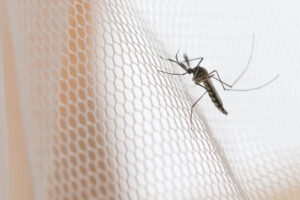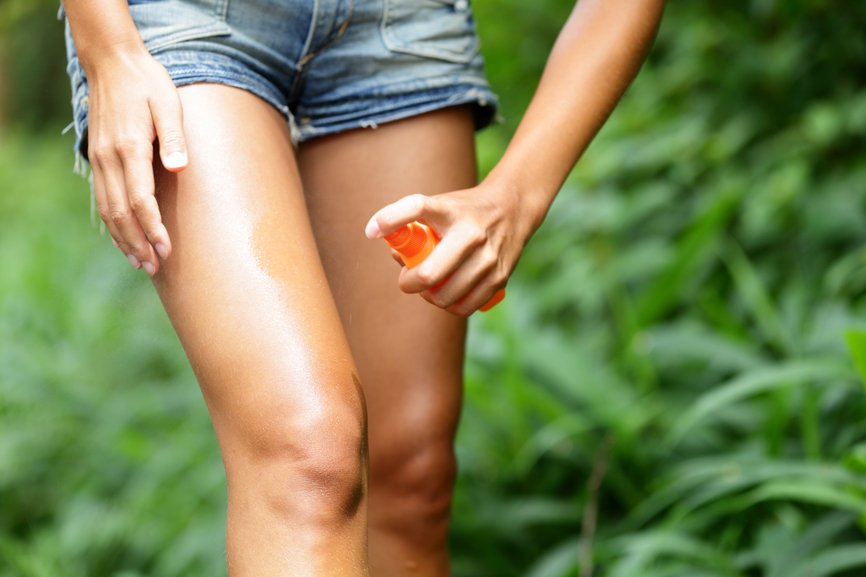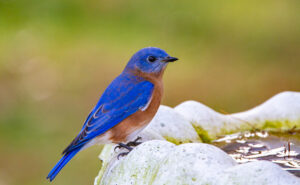What's On This Page?
ToggleIt’s that time of year, buzz, swat, slap … it’s mosquito season. Do you need a natural, safe bug repellent?
Chances are you live in an area that has a thriving population of mosquitoes or other nuisance insect biters. These pesky, irritating insects can pose a health concern. The bites can cause itchy allergic reactions and some of them spread disease like West Nile virus, malaria, Lyme or a newly discovered virus called Chikungunya recognized by the CDC. Mosquitoes infected with a virus can transmit the virus to humans and lead to problems with swelling and inflammation of the brain.

The new virus Chikungunya causes fever, joint pain and swelling, headache, muscle pain, or rash. Even with the innumerable number of mosquitoes on this planet, it is unlikely that you will be bit by a mosquito and end up with a serious, life-threatening infection, but these pests can certainly make an outdoor activity unpleasant with the uncomfortable bites.
Prevention is worth a pound of cure. I’m reminded of being eaten alive while staying in a cottage in the California vineyards a few years ago. It was so bad I had to go get IVs because of head-to-toe hives.
I should have stayed in a clean hotel but regardless, traditional mosquito repellent sprays contain two popular insecticides, DEET or picaridin. Did you know that DEET is thought to be a toxin to the nervous system by many scientists, and it could be especially dangerous to infants toddlers? Here’s a FACT SHEET on DEET presented by the CDC but you can look up studies on pubmed if you want the dirt on it.
DEET and other strong sticky synthetic chemicals should only be used a short period of time, if ever and while I have used it personally I don’t recommend it for everyday use. You may be wondering why I would spray myself but I did during tick season when I took a hike and was worried about getting a major exposure to bugs, mosquitoes, ticks and so forth. We were walking through weeds almost as tall as me!

I’m not super afraid of DEET once in a while, I’m far more afraid of Lyme – it’s a lifelong disabling disease! But understand my exposure to DEET is rare and minimal. It certainly begs the question, isn’t there anything safer if you just want to go for a walk in the park or go to a picnic?
What if you just want to play with your kettlebells in the yard? LOL!
It’s July 4th weekend, most of you are not trekking through high weeds, leaves and mulch and you could use something at night for the fireworks.
Do you really have to take a DEET ‘bath’ every day of the summertime when your exposure is minimal but possible. I would certainly appreciate a natural bug repellent that was safer than DEET. I bet you would too. But is there anything that comes even close to the efficacy of DEET? Apparently there is.
DEET and Picaridin
A study compared DEET and picaridin against four popular essential oils and it was published in the Journal of Vector Ecology. They tested citronella, catnip, vetiver, and hairy basil (yes “hairy” not holy basil). Of those, vetiver provided the strongest repellent effect against the insects. The popular synthetic insecticide picaridin had the least effect of all against all the mosquito species tested.
In another study with the malaria-carrying mosquito, the best bug repellent activity occurred with hairy basil, lemongrass, and citronella. Other helpful natural repellents include emu oil, lily turf or monkey grass, sweet wormwood oil or artemesia annua, and ginger essential oil. Findings from these studies really lend support to the idea of using natural essential oils before smothering yourself with synthetic chemicals.
If you are interested in reading the methods and results, here are two links:
1) Journal of Vector Ecology June 2014
2) Journal of Vector Ecology December 2014

Bird Baths and Kiddie Pools
* Minimize standing water and only fill up the kiddie pool when you’re using it, or the bird bath.
* Throw away rotting plant debris and set up a fan. Mosquitoes are lightweights so any breeze will discourage them.
* Plant some mosquito or bug repellent plants like marigolds, geraniums, lemongrass, and catnip.
* Drop some essential oil of citronella around the border of your porch. Citronella is a natural bug repellent.
You may like my other article, 8 Quick Ways to Soothe Bug Bites and Stings.
My recipe for bug repellent: “Skeeter Spray”
Make your own spray bottle of mosquito repellent by adding the following essential oils to 8 to 10 ounces of water (adjust oils based upon scent if you want):
8 drops Vetiver
6 drops Lavender
4 drops Lemon
2 drop Ginger
3 drops Wormwood oil
Combine these oils together in the water and spray area or arms/legs.
Do not spray into face. Reapply as often as you like.
Here’s another yummy, easy idea. When barbecuing, include fresh rosemary or sage herb in your recipe; if you don’t want it on your food, place it on top of foil on the grill so the smoke (and aroma) act like a repellent. Wear light long sleeved clothing where possible.
Make sure you have enough B complex on board, there is anecdotal evidence to suggest that B-deficient people are more attractive to mosquitoes. If you’re looking for a good brand, try my Mito B Complex – it has active methylated forms so in case your body is short on all the co-factors to active typical B vitamins, my brand of B complex is body-ready.

Suzy Cohen, has been a licensed pharmacist for over 30 years and believes the best approach to chronic illness is a combination of natural medicine and conventional. She founded her own dietary supplement company specializing in custom-formulas, some of which have patents. With a special focus on functional medicine, thyroid health and drug nutrient depletion, Suzy is the author of several related books including Thyroid Healthy, Drug Muggers, Diabetes Without Drugs, and a nationally syndicated column.
